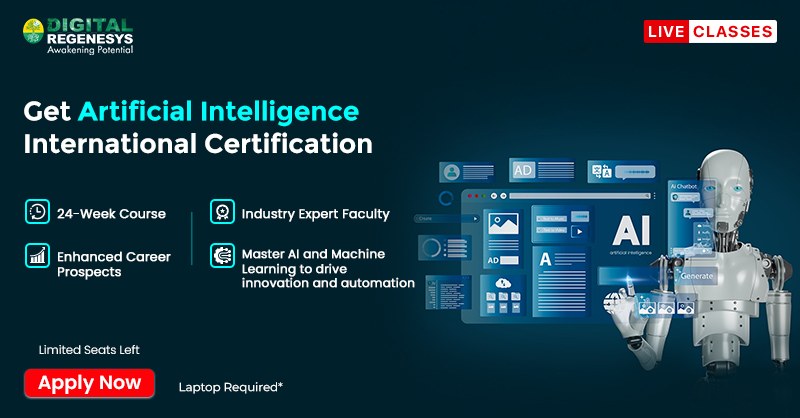AI Career Path in the UK: A Complete Guide from Scratch for Your AI Career

Artificial Intelligence has evolved from a futuristic concept to a daily necessity. Across the UK, industries such as healthcare, banking, and retail are embedding AI into their operations. AI helps hospitals interpret scans, enables banks to detect fraud, and supports retailers in predicting customer needs. This rising demand has placed skilled professionals at the centre of a significant shift in how organisations function.
In this article, we will explain the AI career path in the UK, identify the 7 technical AI skills in demand for 2025, show you how to start a career in Artificial Intelligence, and examine the range of Artificial Intelligence job opportunities in the UK. We will also address which jobs will survive AI in the UK and share tips on how to thrive. Finally, we will highlight how you can build a career as an Artificial Intelligence engineer in the UK with the right learning and career steps.
Why is an AI Career Path in the UK in Demand Now?
Choosing the AI career path in the UK today means entering one of the most promising job markets of the decade. With government strategies and major companies prioritising Artificial Intelligence, professionals who gain the right skills are set for long-term opportunities. The country’s growing AI ecosystem ensures that there are roles for both beginners and experienced experts.
Here are some reasons why now is the right time to find an AI career path in the UK:
- The UK government’s National AI Strategy provides funding for research and education.
- The healthcare, finance, and logistics industries are adopting AI faster than before.
- Companies are short of skilled workers, making it easier for new entrants to find roles.
- Demand for ethical AI practices is creating new types of jobs.
- AI adoption is growing steadily, unlike fields that face frequent instability.
Learn more: What to Learn in Artificial Intelligence

What Are the 7 Technical AI Skills in Demand for 2025?
The demand for Artificial Intelligence skills in the UK is increasing as industries integrate AI into their everyday operations. Employers want professionals who can build, train, and deploy intelligent systems that add measurable value. While AI is broad, specific technical abilities will make you more competitive in 2025. These skills not only open opportunities for research and engineering but also align with new business applications. Here are the 7 technical AI skills in demand for 2025 that will shape future career growth.
Here are the 7 technical AI skills in demand for 2025 that can enhance your career prospects:
1. Python and AI frameworks
Python remains the most popular language for AI, and libraries such as PyTorch and TensorFlow simplify complex tasks. Proficiency in Python allows professionals to design efficient models that power AI applications.
2. Machine learning development
Knowing how to train and evaluate algorithms is central to AI. Skills in supervised and unsupervised learning provide the ability to build predictive systems.
3. Deep learning knowledge
Understanding neural networks is crucial for applications like image recognition and speech processing. Deep learning skills are sought after in industries such as healthcare and automotive.
4. Natural language processing (NLP)
According to Wikipedia, NLP allows computers to understand and interpret human language. This is key in building chatbots and automated translation systems.
5. Data engineering practices
Clean, organised data is essential for effective AI models. Data engineering ensures reliable pipelines for analysis and training.
6. MLOps for production deployment
Once models are built, they must be deployed into real systems. MLOps provides practices to ensure models are scalable, repeatable, and maintainable.
7. AI ethics and fairness
Employers increasingly need professionals who understand transparency, fairness, and accountability in AI development, especially as regulations grow stricter.
For more insights into related fields, check out What’s Inside an Artificial Intelligence Course Syllabus?
How to Start a Career in Artificial Intelligence in the UK
Starting a career in Artificial Intelligence may feel overwhelming, but taking the right steps early can make the journey smoother. The demand for AI professionals is growing across multiple industries in the UK, and many roles are open for individuals who combine technical expertise with problem-solving ability. Whether you are a student, a graduate, or a professional changing fields, there are clear ways to get started.
Here are practical steps on how to start a career in Artificial Intelligence in the UK.
- Learn Python programming because it is widely used for AI model development and data analysis in most industries.
- Study mathematics, particularly linear algebra and statistics, since these concepts are the backbone of machine learning algorithms.
- Build projects that solve real-world problems, as employers often look for evidence of applied knowledge rather than theory alone.
- Take an online or university course in Artificial Intelligence to gain structured knowledge and formal recognition of your skills.
- Network with AI professionals in the UK through conferences, events, and online communities to stay updated on opportunities.
- Apply for internships or entry-level positions that allow you to gain experience while working on practical AI applications.
- Continue learning continuously, as AI is a rapidly evolving field where new frameworks and tools emerge every year.
Through Digital Regenesys’ dedicated Artificial Intelligence certification course, you can learn both the fundamentals and advanced topics in areas such as machine learning, deep learning, and data-driven problem-solving.
Exploring AI Career Paths in the UK
The UK offers a variety of AI-related career paths, each requiring different strengths and interests. Some careers focus on research, while others are more applied within businesses and industries. Exploring these paths helps you decide where your skills fit best and what direction to pursue. Many professionals start in entry-level roles before moving into specialist positions. Understanding the most common paths gives you a clearer picture of where your career could progress in the UK.
Here are some of the most recognised AI career paths in the UK.
- AI research scientist roles involve designing new algorithms and pushing the boundaries of machine learning.
- Artificial Intelligence engineer roles focus on applying existing methods to create usable products and tools.
- AI consultant positions offer guidance to businesses on implementing AI to enhance efficiency and drive innovation.
- Data scientist careers bridge statistics, coding, and business insights using AI-driven approaches.
- AI ethics specialist roles ensure AI systems meet regulatory and ethical standards in the UK.
Explore more from our blog on Why Do We Need Artificial Intelligence?
Artificial Intelligence Job Opportunities in the UK: What’s Out There?
Job opportunities in AI are growing across industries, not only in technology firms but also in finance, retail, and healthcare. As businesses realise the value of automation and predictive analytics, the demand for professionals with AI expertise continues to expand. Many companies are offering remote and hybrid work arrangements, providing greater flexibility for AI professionals.
Understanding the scope of Artificial Intelligence job opportunities in the UK helps you plan your next steps more effectively. Below are some key sectors and opportunities.
- Healthcare uses AI for medical imaging, diagnosis assistance, and personalised treatment.
- Finance relies on AI for fraud detection, trading systems, and customer service chatbots.
- Retail applies AI to demand forecasting, stock control, and personalised shopping experiences.
- Logistics uses AI to optimise delivery routes and supply chain efficiency.
- Public services are adopting AI to enhance data management and improve citizen services.
Bridging the Skills Gap and Thriving
While AI creates new opportunities, a visible skills gap is evident in the UK. Many companies struggle to find individuals who possess both technical expertise and practical knowledge. This gap presents a chance for learners and professionals to position themselves as valuable candidates. Bridging the skills gap requires focused learning, practice, and staying updated with industry needs.
Here are the most effective ways to address this challenge and thrive in the AI field.
- Take structured AI courses that provide strong foundations and recognised certificates.
- Join industry events and online communities to keep track of the latest AI tools.
- Build personal projects to demonstrate your ability to apply knowledge to real problems.
- Develop your soft skills, such as communication and teamwork, as AI careers often require collaboration.
- Stay flexible and open to continuous learning, since AI is constantly evolving.
Next Steps: Launching Your AI Career Path in the UK
Taking the first step in an AI career requires planning, but opportunities are more accessible than ever. The UK’s supportive environment for technology and research makes it easier to find courses, mentors, and jobs. Whether you want to become a research scientist or an AI consultant, following a clear plan will help you progress faster.
To launch your AI career path in the UK, you can focus on the following steps that combine technical growth with career development.
- Choose a specialisation that aligns with your interests, such as machine learning or natural language processing.
- Enrol in an AI course that provides practical experience and recognised learning outcomes.
- Create a portfolio of projects that demonstrate your technical ability and creativity.
- Apply for internships or entry-level jobs that provide exposure to real-world applications.
- Continue learning advanced skills to position yourself for senior AI roles.
Check our detailed post on Career Guide on How to Become an Artificial Intelligence Engineer.
Conclusion
The demand for AI professionals is growing, and the UK is positioning itself as a hub for research and application. From healthcare to finance, opportunities are increasing for those who take the time to build technical and ethical expertise. By gaining the right skills, you can shape a strong future in AI while staying relevant in a world where automation is becoming normal. If you are committed to learning, your AI career path in the UK can lead to fulfilling and impactful roles.
Digital Regenesys is an edtech platform that helps learners build essential skills in Artificial Intelligence. The platform also offers flexible online learning options that suit different schedules. Taking part in such structured learning can bridge the gap between theory and real-world application.
Start your journey today with Digital Regenesys and build a career-ready skill set.
Last Updated: 24 September 2025
